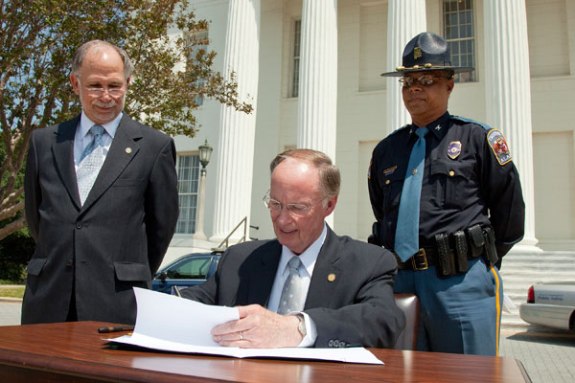Last week, Alabama Governor Robert Bentley publically criticized a bill intended to revise key sections of the state’s controversial immigration law (HB 56). He even announced a special legislative session to address his issues with the bill—namely, a provision that requires school officials to check the immigration status of enrolling students and that of their parents and a provision that requires Alabama’s Department of Homeland Security to publically post the names of undocumented immigrants on their website. The day after his announcement, however, Governor Bentley backpedaled his criticisms, declared the legislature didn’t have the “appetite to address further revisions,” and signed the bill (HB 658) into law.
Governor Bentley explained his reversal in a statement following the bill’s signing:
The bill that the full Senate ultimately passed was different and did not reflect all of the changes we had agreed upon. However, the bill did include most of the suggested revisions and represented substantial progress in simplifying the bill while keeping it strong … as we worked with legislators during the special session, it became clear that the Legislature did not have the appetite for addressing further revisions at this time.
In an effort to remove the distraction of immigration from the other business of the special session, I decided to sign House Bill 658 and allow the progress made in the legislation to move forward. We can now also move forward on the other business of the special session.
So how does HB 658 affect Alabama’s already extreme immigration law? In addition to keeping the “papers please” provision of the original law intact, HB 658:
- Adds a new provision that requires the Alabama Department of Homeland Security to publically list the names and counties of any undocumented immigrant who appears in court for any state violation on its website
- Continues to require school administrators to check the immigration status of enrolling students and that of their parents
- Continues to criminalize religious and humanitarian groups for “harboring crimes,” i.e., providing humanitarian relief to its members
- Continues to prohibit landlords from renting apartments to undocumented immigrants (a provision that has been struck down in every state that has tried to enact such a law)
- Increases the criminal penalty for harboring undocumented immigrants
While Governor Bentley expressed concern over the school provision and the provision that requires the public listing of undocumented immigrants, he noted that “there [were] too many positive aspects of House Bill 658 for it to go unsigned”—referring to changes that lessen restrictions and penalties on businesses who have been found to hire or employ undocumented immigrants. HB 658 also exempts from the original business provision, which voids all business contacts with undocumented immigrants, contracts entered into prior to the enactment of the law.
To date, several provisions of HB 56 have been temporarily enjoined by the courts, including the school provision, harboring provision, provisions that make it a crime for an unauthorized immigrant to fail to carry immigration documentation or apply for, solicit or perform work, a provision baring state courts from enforcing a contract with an unlawfully present person, and a provision which makes it a felony for an undocumented immigrant to enter into a “business contract” with the state. The courts said they would not issue a final ruling until after the Supreme Court issues a decision on Arizona’s immigration law in June.
In the meantime, Govenor Bentley said they will “re-address issues” with the law “if the need arises.”
Photo by governor.alabama.gov.
FILED UNDER: Alabama, Children, governor bentley, HB 56, hb 658, Immigration Law, Robert Bentley, Supreme Court, undocumented immigration



